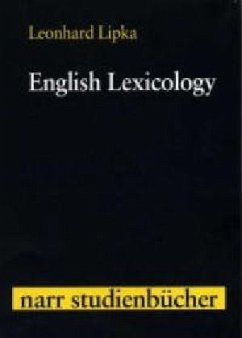On words and their functions: all relevant aspects of English Lexicology
This book aims to provide a modern, comprehensive, interdisciplinary survey of all relevant aspects of English and general lexicology. On the basis of the thoroughly revised former Outline of English Lexicology it represents the state of the art in 2002. As an introduction to be used in university courses it gives an up-to-date survey of approaches to all aspects of words and their functions and to the English vocabulary. In particular, the book stresses the Productive processes in the lexicon, i.e. dynamic lexicology, and offers new and so far neglected perspectives. Besides discussing lexical structure, word semantics and word-formation, English Lexicology offers new directions in going beyond a purely Language-immanent, structuralist approach. The referent of a word is not regarded as a purely mental conceptual unit, but as a concrete entity or a class of objects with certain properties. Thus, visual andother perceptual phenomena play a prominent role in modern lexicology as well. Also, words, as a subclass of signs, are considered in use, esp. their functions in texts and situations. Not only pragmatic and semiotic approaches are incorporated, but also Cognitive Linguistics, such as conceptual aspects of categorization, metaphor and metonymy.
This book aims to provide a modern, comprehensive, interdisciplinary survey of all relevant aspects of English and general lexicology. On the basis of the thoroughly revised former Outline of English Lexicology it represents the state of the art in 2002. As an introduction to be used in university courses it gives an up-to-date survey of approaches to all aspects of words and their functions and to the English vocabulary. In particular, the book stresses the Productive processes in the lexicon, i.e. dynamic lexicology, and offers new and so far neglected perspectives. Besides discussing lexical structure, word semantics and word-formation, English Lexicology offers new directions in going beyond a purely Language-immanent, structuralist approach. The referent of a word is not regarded as a purely mental conceptual unit, but as a concrete entity or a class of objects with certain properties. Thus, visual andother perceptual phenomena play a prominent role in modern lexicology as well. Also, words, as a subclass of signs, are considered in use, esp. their functions in texts and situations. Not only pragmatic and semiotic approaches are incorporated, but also Cognitive Linguistics, such as conceptual aspects of categorization, metaphor and metonymy.

